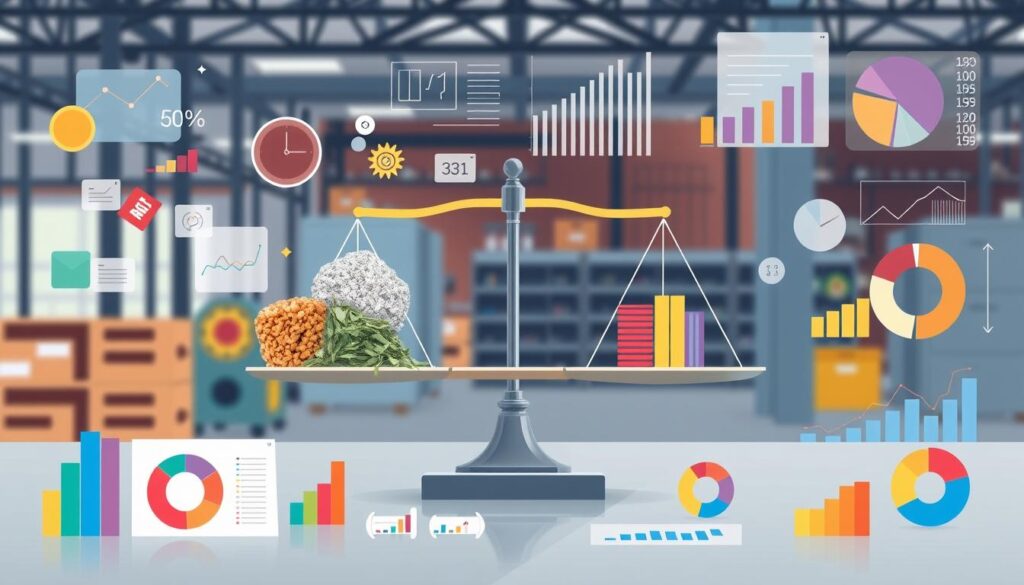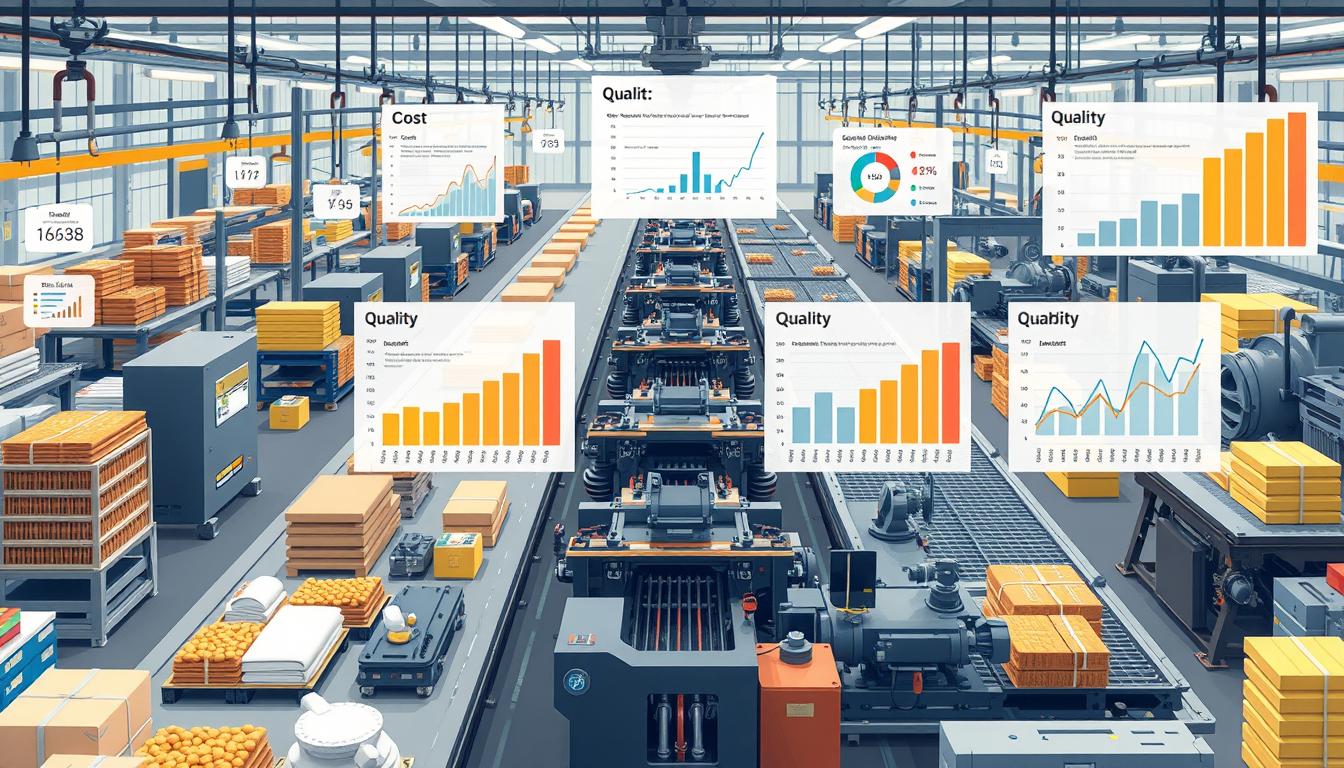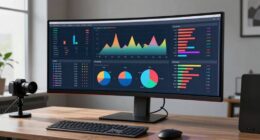Every day in the manufacturing world, you aim for manufacturing efficiency. You look for that ideal mix of using resources fully and cutting waste. Sometimes, you find that things don’t go as planned, which can lead to extra costs. These costs can eat into your profits because of mistakes in using resources. This is where knowing about material usage variance (MUV) is crucial. It’s not just a number; it guides you to better financial health and excellence in operations.
By looking into MUV, you can spot differences between what you expected to use and what you actually used. This gives you insights that can change how you make decisions. Regularly checking this helps you pick your suppliers better and set your prices more wisely. As you deal with the challenges of making products, remember: every bit of data helps you build a more efficient and profitable future.
Key Takeaways
- Material usage variance is crucial for effective resource management.
- Regular analysis of MUV leads to improved decision-making.
- Favorable variances mean savings, while unfavorable ones signal areas for improvement.
- Understanding overall production efficiency requires analyzing yield variance alongside MUV.
- Data-driven insights can revolutionize your strategic sourcing decisions.
Introduction to Material Usage Variance
Understanding material usage variance is key for producers. This metric shows the difference between actual and expected material use during production. It helps businesses understand how well they are using their materials and where to improve.
Defining Material Usage Variance
Material usage variance is important in making products. It shows if you’re using materials efficiently. Knowing this helps set realistic goals and improve your operations.
Importance in Manufacturing
MUV is crucial for more than just saving money. It helps find where your material use could be better. This leads to smarter budgeting and higher quality products. With MUV insights, companies can allocate resources better and make their production more profitable.
Calculating Material Usage Variance
Understanding how to calculate material usage variance is important for measuring production efficiency. This involves looking at the difference between the actual amount of material used and what was planned. By applying this formula, companies can find out where they might be wasting resources or not being efficient enough.
Understanding the Formula
Here’s how the formula for material usage variance is explained:
| Formula Component | Description |
|---|---|
| Actual Quantity Used | The actual amount of material used in making products. |
| Standard Quantity Expected | How much material the company thought it would use. |
| Standard Cost per Unit | The cost expected for each unit of material. |
The formula looks like this: Usage Variance = (Actual Quantity Used – Standard Quantity Expected) x Standard Cost per Unit. This helps businesses see if they’re using more or less material than they thought they would.
Example of Calculation
Let’s say a factory was supposed to use 1,000 units of material but ended up using 1,200 units. Each unit costs $5. When we use the formula, it looks like this:
- Actual Quantity Used: 1,200 units
- Standard Quantity Expected: 1,000 units
- Standard Cost per Unit: $5
- Material Usage Variance: (1,200 – 1,000) x $5 = $1,000
This tells us that the factory used more material than planned, which isn’t a good sign. It means the company needs to look into why this happened. They need to figure out how to do better in the future.

Factors Influencing Material Usage Variance
Understanding factors that affect Material Usage Variance (MUV) boosts manufacturing. By looking into these elements, proactive steps can be taken. This optimizes production.
Quality of Raw Materials
Raw material quality has huge effects. Better raw materials mean less waste and more efficiency. On the flip side, low-quality materials lead to more usage and increased variance. Getting high-quality materials could save money by lowering MUV.
Workforce Skill Levels
Employee skills impact material use. Skilled workers waste less, which means a lower MUV. Less skilled workers use materials less efficiently. This raises variance. Training and skill development for employees can increase material efficiency.
Equipment Maintenance and Efficiency
Equipment quality affects MUV greatly. Good machines work efficiently with less waste. However, bad or old machinery can cause inefficiencies. It’s vital to maintain and upgrade machines regularly. This reduces risks and ensures the best performance.

| Factor | Impact on MUV | Recommended Actions |
|---|---|---|
| Quality of Raw Materials | High quality reduces waste and variance | Invest in reliable suppliers |
| Workforce Skill Levels | Higher skills lead to lower waste | Provide training and development |
| Equipment Maintenance | Well-maintained machines decrease waste | Establish regular maintenance checks |
Addressing these factors helps control MUV. It also boosts efficiency and profits in manufacturing.
Impact of Material Usage Variance on Financial Performance
Understanding how material usage variance affects finance is key for any factory. If this variance is large, it messes up your income records. It makes your production costs go up because you’re using more material than planned.
This means your goods cost more to make. So, your profit margin drops, which hurts your bottom line.
Effects on Income Statements
MUV has a big impact on financial reports. A small mistake in tracking material can affect your entire financial health. By keeping an eye on how much material is used, businesses can avoid extra costs. This helps keep profits healthy and the company strong.
Impact on Inventory Valuation
Material variance is also important for valuing inventory. Using too much material can lead to too much stock. This can tie up your money. Too much stock also means spending more on storage and management, which can affect your cash flow.
Fixing these issues is key for managing your stock well. It ensures you use resources wisely.
Influence on Cash Flow Statements
Material variance also impacts cash flow. Using more resources means spending more cash on materials. This can make it hard to maintain a good cash flow. Managing MUV well can help keep your cash flow stable. It ensures you have enough money for running the business and growing it in the future.
FAQ
What is material usage variance (MUV)?
Why is material usage variance important in manufacturing?
How do you calculate material usage variance?
Can you provide an example of how to calculate MUV?
FAQ
What is material usage variance (MUV)?
Material usage variance (MUV) shows the difference in expected and actual raw material used during production. It measures how well a business manages its resources.
Why is material usage variance important in manufacturing?
MUV is key for spotting issues in how materials are used, which aids in controlling costs. It leads to more profits. Keeping track of MUV also fine-tunes budgeting and operations for better efficiency.
How do you calculate material usage variance?
To find material usage variance, use the formula: Usage Variance = (Actual Quantity Used – Standard Quantity Expected) x Standard Cost per Unit. This highlights where production might be using too much or too little material.
Can you provide an example of how to calculate MUV?
Imagine expecting to use 1,000 units of materials but you use 1,200 units at each. The MUV would be (1,200 – 1,000) x =
FAQ
What is material usage variance (MUV)?
Material usage variance (MUV) shows the difference in expected and actual raw material used during production. It measures how well a business manages its resources.
Why is material usage variance important in manufacturing?
MUV is key for spotting issues in how materials are used, which aids in controlling costs. It leads to more profits. Keeping track of MUV also fine-tunes budgeting and operations for better efficiency.
How do you calculate material usage variance?
To find material usage variance, use the formula: Usage Variance = (Actual Quantity Used – Standard Quantity Expected) x Standard Cost per Unit. This highlights where production might be using too much or too little material.
Can you provide an example of how to calculate MUV?
Imagine expecting to use 1,000 units of materials but you use 1,200 units at $5 each. The MUV would be (1,200 – 1,000) x $5 = $1,000. This shows you’ve used more materials than planned.
What impact does the quality of raw materials have on MUV?
Quality of materials greatly affects MUV. Poor quality often means using more to meet standards, increasing waste and MUV.
How do workforce skill levels influence material usage variance?
Skill levels of the workforce affect MUV. More skilled workers use materials more effectively, reducing waste and MUV.
How does equipment maintenance affect MUV?
Good machinery condition lowers MUV by running efficiently and reducing waste. In contrast, bad upkeep can increase MUV by causing inefficiencies.
In what ways does MUV affect income statements?
MUV directly impacts income statements by raising production costs when material use deviates from the norm. This can lower gross profit margins, hurting a company’s profitability.
What is the relationship between MUV and inventory valuation?
Using too much material can inflate inventory levels, tying up capital and raising storage costs. This makes management of cash flow harder.
How does material usage variance influence cash flow statements?
Higher material use demands more cash to buy these materials, affecting the company’s cash flow. Managing MUV well ensures enough cash is available for the business to run smoothly and grow.
,000. This shows you’ve used more materials than planned.
What impact does the quality of raw materials have on MUV?
Quality of materials greatly affects MUV. Poor quality often means using more to meet standards, increasing waste and MUV.
How do workforce skill levels influence material usage variance?
Skill levels of the workforce affect MUV. More skilled workers use materials more effectively, reducing waste and MUV.
How does equipment maintenance affect MUV?
Good machinery condition lowers MUV by running efficiently and reducing waste. In contrast, bad upkeep can increase MUV by causing inefficiencies.
In what ways does MUV affect income statements?
MUV directly impacts income statements by raising production costs when material use deviates from the norm. This can lower gross profit margins, hurting a company’s profitability.
What is the relationship between MUV and inventory valuation?
Using too much material can inflate inventory levels, tying up capital and raising storage costs. This makes management of cash flow harder.
How does material usage variance influence cash flow statements?
Higher material use demands more cash to buy these materials, affecting the company’s cash flow. Managing MUV well ensures enough cash is available for the business to run smoothly and grow.









